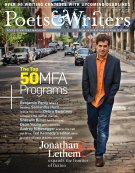The Melancholy Dane, a quarterly magazine based in New York City whose stated goal is "conquering the philistines one issue at a time," accepts submissions of poetry and fiction by writers from all over the world. The latest issue, which is divided into three sections—The City, The Country, and Bildungsroman—is available in print or as a digital edition.
Christopher Cokinos, editor of Isotope, the six-year-old journal of literary nature and science writing published at Utah State University, which provides the majority of its financial backing, says the "magazine's future is uncertain—frankly, in peril" and asks fans of the biannual journal to help by donating money or writing to the university's president to show their support.
Our Stories, an online publisher of short fiction and interviews with established authors, has developed a unique lit mag model: For each story they reject, the editors—who are sympathetic to writers' frustration with receiving the often-generic rejection letter—promise to not only offer their general impressions but also "point out the strengths and weaknesses and give you suggestions on how to fix your story."
The Summer 2009 issue of Puerto del Sol, the biannual journal published by the English department at New Mexico State University, features an updated design in a new, broader format. The changes to the forty-four-year-old magazine were instituted by its new editor in chief, Carmen Giménez Smith, who succeeded Kevin McIlvoy last year.
Dzanc Books, the nonprofit publishing conglomerate established in 2006 that, so far, has acquired the literary magazine Monkeybicycle, Black Lawrence Press, and OV Books, recently announced its latest venture: The Collagist, a monthly online magazine, publishes poetry, fiction, essays, book reviews, and, in each issue, an excerpt from a forthcoming novel.
In September the editors of Alimentum, the biannual journal described by the New York Times as "small enough to carry with you for mental and aesthetic nourishment breaks," opened their regular reading period, during which they will consider submissions of fiction and creative nonfiction "all around the subject of food."
Crab Creek Review has been committed to introducing its readers to poets and fiction writers from the Northwest for the past twenty-five years, but the biannual journal published in Kingston, Washington, is also accepting submissions—including creative nonfiction—from writers in all regions of the country.
The most recent issue of Forklift, Ohio, a fifteen-year-old slim and trim journal hand-assembled from a variety of recovered materials, such as manufacturing supply catalogues and engineering manuals, features work by Bob Hicok, G. C. Waldrep, Joshua Beckman, and previously unpublished poems from Beat poet Gregory Corso's final manuscript, "The Golden Dot." Even though (or perhaps because) the editors "take poetry quite seriously, if little or nothing else," they don't accept unsolicited poetry submissions, preferring to receive queries from poets first.









